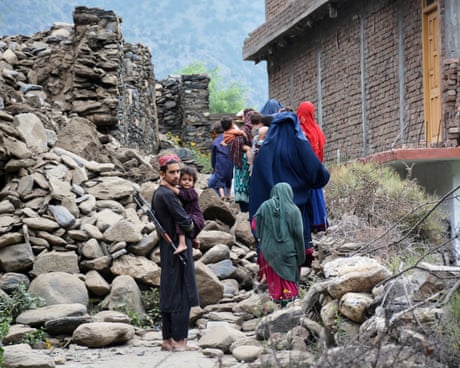The first rescue workers reached Bibi Aysha’s village more than 36 hours after an earthquake devastated settlements across eastern Afghanistan’s mountainous areas on Sunday. But instead of bringing relief, the sight of them heightened her fears; not a single woman was among them.
Afghan cultural norms, enforced even in emergencies by the ruling Taliban, forbid physical contact between men and women who are not family members. In the village of Andarluckak, in Kunar Province, the emergency team hurriedly carried out wounded men and children, and treated their wounds, said Ms. Aysha, 19. But she and other women and adolescent girls, some of them bleeding, were pushed aside, she said.
“They gathered us in one corner and forgot about us,” she said. No one offered the women help, asked what they needed or even approached them.
Tahzeebullah Muhazeb, a male volunteer who traveled to Mazar Dara, also in Kunar Province, said that members of the all-male medical team there were hesitant to pull women out from under the rubble of collapsed buildings. Trapped and injured women were left under stones, waiting for women from other villages to reach the site and dig them out.
“It felt like women were invisible,” said Mr. Muhazeb, 33. He added, “The men and children were treated first, but the women were sitting apart, waiting for care.”
If no male relative was present, he said, rescue workers dragged dead women out by their clothes, so as not to make skin contact.
More than 2,200 people died and 3,600 others were injured in the magnitude 6 quake that flattened countless hamlets and villages, according to figures released by Afghanistan’s government.
The response to the quake on Sunday has epitomized the dual standards that women and girls face in Afghanistan, aid groups and humanitarian organizations say, trapped both under the rubble and the weight of gender discrimination.
“Women and girls will again bear the brunt of this disaster, so we must ensure their needs are at the heart of the response and recovery,” the special representative for U.N. Women Afghanistan, Susan Ferguson, said in a statement this week.
Though the Taliban have not released a gender breakdown of the casualties, women have faced an especially harsh ordeal, made worse by neglect and isolation, more than half a dozen doctors, rescue workers and women in areas hit by the quake said in interviews.
Afghanistan faces a critical shortage of health care workers and, in particular, of women in that field. Last year, the Taliban imposed a ban on women’s enrollment in medical education. The dearth of female doctors and rescue workers has been all too evident in the wake of the earthquake.
Women and girls in Afghanistan face some of the world’s most severe restrictions under the Taliban, who took power four years ago and have remained unflinching, even as most of the Muslim world, countless human rights organizations and bodies like the World Bank have warned against the long-lasting effects of such policies on the country’s social fabric and economy.
Girls are prohibited from going to school beyond sixth grade. Women cannot travel far without a male companion and are barred from most jobs, including in nonprofits and humanitarian organizations. Afghan women working for U.N. agencies have faced repeated harassment, culminating in threats so serious this year that the agencies instructed their female employees to temporarily work from home.
A New York Times journalist who reached the Mazar Dara area the day after the quake didn’t see any women among the medical, rescue or aid teams treating victims. In one district hospital visited, there were no female staff members.
A spokesman for the Taliban-run Ministry of Health acknowledged that there was a lack of female health workers in the quake-ravaged areas.
“But in hospitals in Kunar, Nangarhar and Laghman, the largest number of female doctors and nurses are working, especially to treat earthquake victims,” Sharafat Zaman, the spokesman, said of the worst-hit provinces.
In Ms. Aysha’s village, not a single female aid worker had come as of Thursday, nearly four days after the earthquake, she said. She and her 3-year-old son had spent the past three nights out in the open, as rain that fell over the past few days prevented her from reaching a shelter or the city where her husband works.
“God saved me and my son,” Ms. Aysha said. “But after that night, I understood — being a woman here means we are always the last to be seen.”
Safiullah Padshah contributed reporting.
Fatima Faizi is a reporter in the Kabul, Afghanistan, bureau.
 Afghanistan Peace Campaign
Afghanistan Peace Campaign



